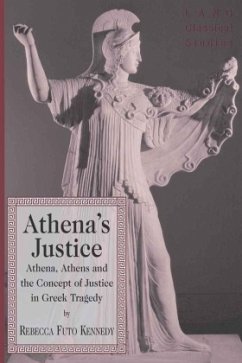Athena is recognized as an allegory or representative of Athens in most Athenian public art except in tragedy. Perhaps this is because tragedy is rarely studied as a public art form or, perhaps, because her character is not static in tragedy. Although Athena's characterization changes to fit the needs of a particular drama, her clear connection with justice remains true throughout and suggests that she is always the representative of the city and its institutions. Athens, the city Athena protected, experienced a dramatic transformation in the fifth century: its political institutions, physical landscape, military power and international prestige underwent dynamic change. Athena, its goddess and its symbol, simultaneously transformed as well, although not always for the better.
Athena's Justice follows the question of civic identity and ideology in Athenian tragedy, focusing specifically on the link between tragedy and its influence upon identity creation and promotion during the period when Athens was asserting itself as an imperial power. Through examination of tragedies in which Athena appears, this book traces the process by which Athens came to identify itself with its legal system, symbolized by Athena on stage, and then suffered the corruption of that system by the exercise of imperial power. Athena's Justice is essential reading not just for classicists and ancient historians, but for anyone interested in the interaction between art and politics and the process by which human beings in any period seek to shape their identity as a people.
Athena's Justice follows the question of civic identity and ideology in Athenian tragedy, focusing specifically on the link between tragedy and its influence upon identity creation and promotion during the period when Athens was asserting itself as an imperial power. Through examination of tragedies in which Athena appears, this book traces the process by which Athens came to identify itself with its legal system, symbolized by Athena on stage, and then suffered the corruption of that system by the exercise of imperial power. Athena's Justice is essential reading not just for classicists and ancient historians, but for anyone interested in the interaction between art and politics and the process by which human beings in any period seek to shape their identity as a people.
«Rebecca Futo Kennedy's book is a welcome addition to the political readings of Greek tragedy. Her attempt to tie the representations of Athena in surviving plays to changes in Athenian self-understanding and imperial fortunes is at once provocative and nuanced. The connections she makes between history, politics, and literature will interest scholars of many stripes.» (Geoff Bakewell, Associate Professor of Classics, Creighton University, Omaha, Nebraska)
«This is an adventurous and original study that explores important questions, and proposes some unexpected new answers, concerning the relationship between religion, politics, morality and Athenian self-image in the plays of Aeschylus, Sophocles and Euripides. As a model of justice, moderation and wise leadership, the goddess Athena was a powerful symbol to the Athenians of their own city's claims to cultural and political supremacy, and Rebecca Futo Kennedy shows skillfully how this symbol was deployed - and sometimes qualified and questioned - in their theatrical productions.» (Mark Griffith, Professor of Classics, and of Theater, Dance and Performance Studies, University of California, Berkeley)
«This is an adventurous and original study that explores important questions, and proposes some unexpected new answers, concerning the relationship between religion, politics, morality and Athenian self-image in the plays of Aeschylus, Sophocles and Euripides. As a model of justice, moderation and wise leadership, the goddess Athena was a powerful symbol to the Athenians of their own city's claims to cultural and political supremacy, and Rebecca Futo Kennedy shows skillfully how this symbol was deployed - and sometimes qualified and questioned - in their theatrical productions.» (Mark Griffith, Professor of Classics, and of Theater, Dance and Performance Studies, University of California, Berkeley)








